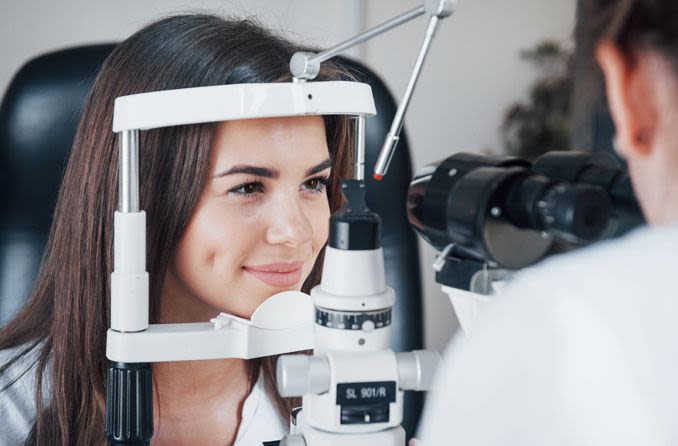Preparing for an eye exam: What to expect

Common questions about eye exams include:
How much does an eye exam cost?
How frequently should I have my eyes examined?
What should I bring with me to my exam?
These guidelines can help you prepare for an eye exam. The first step is finding an optician near you.
Eye exam cost
Eye exams are generally available from opticians found on most high streets or in shopping centres. Usually opticians can be independent or part of a multiple or chain. Here, an optometrist will be responsible for testing your eyes.
The cost of an eye exam can vary significantly, based on where you live and other factors, including:
The tests that are included in the exam, whilst some are mandatory, others can be an optional extra
Whether the exam includes a contact lens fitting or other contact lens-related services
The cost of an eye exam can range widely depending on these factors, and whether some or all of the exam is covered by the NHS.
Eye exams for contact lenses can cost more than routine exams to check your general eye health and update your eyeglasses prescription.
When comparing how much an eye exam costs, be sure you are comparing "apples to apples." A comprehensive eye exam should include at least the following:
A review of your personal and family health history and any history of eye problems
Evaluation of your distance and near vision with an eye chart
Evaluation for being short sighted, long sighted or the presence of astigmatism
Near vision testing to determine if you have presbyopia and need progressive lenses
Evaluation of your eyes' ability to work together as a team
If you are over 40 or have a family history of glaucoma; an eye pressure test and examination of the optic nerve to rule out glaucoma
Examination of the interior of your eyes to rule out other eye problems, such as cataracts and macular degeneration
Contact lens exams typically include additional tests and procedures beyond those noted above.
Be sure to ask what tests are included when you obtain information about eye exam costs. Some locations will advertise a low exam fee, but upon arrival you may be informed you must pay extra if you want certain procedures — such as pupil dilation, retinal photos, etc. — that may be included in a higher exam fee quoted elsewhere.
Certain "intangibles" also should be considered when you compare eye exam costs. These might include: the professionalism and friendliness of the optician and staff; the level of training of the dispensing opticians or optical advisors; how long you must wait to be seen; how advanced (or outdated) the exam equipment is; the convenience of the practice; and hours of operation.
It's also a good idea when choosing an optician to ask friends for referrals and to "shop around" first via a personal visit to the practice before scheduling an exam.
When to have your eyes examined
Most eye care professionals recommend that you have a comprehensive eye exam every one to two years, depending on your age, risk factors and whether you currently wear spectacles or contact lenses.

Children need regular eye exams to detect vision problems that may interfere with learning.
Children
Routine eye exams are essential for children to be ready to learn in school, and experts say more than 80 percent of information children receive in classrooms is presented visually.
Children will generally have their eyes monitored from birth to around 6 months of age by a health visitor. However, from age three they should start to be seen by an optometrist in a practice. Children up to the age of 16 are eligible for a NHS sight test every year and those in full time education up to the age of 19, every 2 years.
Children with risk factors for vision problems may need their first eye exam earlier than 6 months of age and may need more frequent eye exams throughout childhood.
Examples of risk factors include:
History of premature birth or low birth weight
Infection of mother during pregnancy (examples: rubella, venereal disease, herpes, AIDS)
Developmental delays
Turned or crossed eyes (strabismus)
Family history of eye disease
High refractive errors
Physical illness or diseases
Also, children who currently wear eyeglasses or contact lenses should have annual eye exams.
Adults
To maintain a lifetime of healthy vision, adults ages 18 to 60 should have a comprehensive eye exam at least every two years. Older adults (age 61 and older) may need them at shorter intervals.
"At risk" adults should have more frequent exams. Risk factors for adults include:
A family history of eye disease (glaucoma, macular degeneration, etc.)
Diabetes or high blood pressure
A visually demanding occupation or one that may pose hazards to the eyes
Taking prescription or non-prescription drugs that may have visual or eye-related side effects
Previous eye injuries or eye surgery (including cataract surgery)
If you have any doubts about how often you (or your children or parents) should have your eyes examined, ask your eye doctor.
Who should I see for my eye exam?
There are three different kinds of eye care professionals: ophthalmologists, optometrists and dispensing opticians. For a routine sight exam, you should see an optometrist but for any further investigation or surgery you may be referred to an ophthalmologist.
Ophthalmologists An ophthalmologist is a medically trained doctor who commonly acts as both physician and surgeon. They examine, diagnose and treat diseases and injuries in and around the eye and undergo extensive training.
Ophthalmologists generally train for 5 years at medical school for a degree in medicine before working as 2 years as a newly qualified doctor doing basic medical training. Once this is complete, they undergo 7 years of ophthalmic specialist training and sit examinations set by the Royal College of Ophthalmologists.
Optometrists (OO) (previously known as ophthalmic opticians) are primary health care specialists trained to examine the eyes to detect defects in vision, signs of injury, ocular diseases or abnormality and problems with general health.
Optometrists study at university for at least three years and must participate in a "pre-registration" year of assessed clinical training in practice, before being deemed to have the knowledge and skills needed to be registered. Once registered, they have the opportunity to develop their interests in specialist areas of practice and undergo further training.
Optometrists perform eye exams and prescribe glasses, contacts, low vision aids, and vision therapy to correct vision problems. They also can treat most eye diseases with medications. But, with a few exceptions, optometrists typically are not trained or licensed to perform eye surgery.
Dispensing Opticians (DO) are eyecare professionals who use prescriptions written by an optometrist or an ophthalmologist to recommend and fit glasses and other eyewear.
All registered dispensing opticians have undergone a minimum of three years academic and practical training to qualify. Only dispensing opticians registered with the General Optical Council can practise in the UK, or use the protected title dispensing optician. Some undergo further training to specialise in the fitting and supply of contact lenses.
Now that you know what an eye exam costs, when to have an eye exam and how to choose an optician, all that's left is to book your next eye exam.
READY TO BOOK AN EYE EXAM? Find an optician near you.
Page published on Tuesday, 25 June 2019






